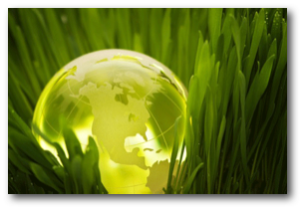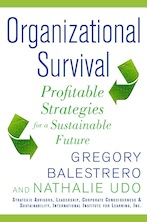 I feel like I spent the last 6 months in a dungeon. Outside of consulting just enough to pay my bills, I spent the remainder of my time writing a business book together with Greg Balestrero, my partner in crime! The book will be released by McGraw-Hill end this year and the title is Organizational Survival: Profitable Strategies for a Sustainable Future.
I feel like I spent the last 6 months in a dungeon. Outside of consulting just enough to pay my bills, I spent the remainder of my time writing a business book together with Greg Balestrero, my partner in crime! The book will be released by McGraw-Hill end this year and the title is Organizational Survival: Profitable Strategies for a Sustainable Future.
Even though we walked different paths in life, the drive for Greg and myself to write this book is the same. The world is faced with several crises: global climate change, a growing global population and middle class that could exhaust the planet’s resources and challenge our very survival by the middle of this century. Unless we change the way we are doing business, these crises will affect the supply chains of every company on our planet. Yes, there are many books on Sustainability; however, this is a conversation that needs to be had and to be continued. Today, like never before, we urgently need innovation to manage and protect precious natural resources; creative ways to avoid the depletion of critical raw materials; inventive approaches to reducing and repairing environmental damage; and strategies for building sustainable communities.
I would like to share some excerpts of the to-be-published book with you this week and start the conversation. Please let me know your thoughts and ideas!!
——
 I have traveled a lot in my life, both for pleasure and work, and in the process I had developed a healthy distrust of corporate intentions regarding nature, wildlife, and people, simply from seeing the damage done on land and under water. When I heard more and more companies talking about Corporate Social Responsibility but could not see real progress, either due to lack of transparency or lack of action, it sounded to me more like a marketing tool than true intentions to sustain our environment and societies. My personal awakening came in about 2008, when I started to work closely with Japanese corporations
I have traveled a lot in my life, both for pleasure and work, and in the process I had developed a healthy distrust of corporate intentions regarding nature, wildlife, and people, simply from seeing the damage done on land and under water. When I heard more and more companies talking about Corporate Social Responsibility but could not see real progress, either due to lack of transparency or lack of action, it sounded to me more like a marketing tool than true intentions to sustain our environment and societies. My personal awakening came in about 2008, when I started to work closely with Japanese corporations
Corporations rooted in Japanese culture have long-term visions, covering multiple generations. They are concerned with the sustainability of their organizations, but they also care about the societies in which they operate, since that affects the company’s sustainability. Working closely with these corporations, learning their histories, hearing their executives talk about sustainability and how it is part of their value system, seeing how they supported their words with actions and how they raise the awareness of their employees in this area made me realize two things. First, I realized I was not taking any action in this area that was critically important to me. And second, I realized that corporations hold the key to the social, environmental, and ethical improvements needed to change the course we and the planet are on. They have the necessary reach through their value and supply chains, and they have the necessary resources.
The feeling of being overwhelmed by the gigantic problem we are facing had muted my “I’m in control” mentality. Experiencing the real passion some Japanese organizations have for improving the communities they touch convinced me that I needed to do something. So here I am writing this book with my dear friend, Greg Balestrero. I want to do my part to raise awareness and inspire more companies to transform their organizations to become more sustainable. In the process, they will improve the health of the planet and of society at large—and also the health of their bottom line, as you will read in this book!
The Dalai Lama says, “If we make consistent effort, based on proper education, we can change the world. We are selfish, that’s natural, but we need to be wisely selfish, not foolishly selfish. We have to concern ourselves more with others’ well being, that’s the way to be wisely selfish. We have the ability to take the long-term benefit into account. I think it is possible to make real change in this century.” I also believe that real change is possible, even before we hit the middle of this century!
Why would we entertain writing a book on the relationship of global sustainability and corporate strategy with so many other sustainability books out there? In part, it is because we want to continue a meaningful conversation about the change that needs to happen. The massive global library of information on sustainability is not merely a virtual shelf filled with discrete, unrelated bytes of information. On the contrary, each book and every article contributes to shaping our beliefs about the future of business and the planet. Just as creating this book has shaped our beliefs, we hope reading it will shape yours and encourage you to act.
More importantly, we believe leaders at the corporate, business, and government levels continue to assume that we have plenty of time to change course. In reality, time is running out. We are now well into the second decade of the century, and while we have seen remarkable transformations taking place, there still isn’t sufficient progress to avoid catastrophic damage to our businesses, our societies, and global prosperity. We want to raise the level of urgency in the conversation and spur rapid, transformational changes.
But also, it’s because the changes we need aren’t just about the environment or natural resources. Most sustainability books focus on those angles, and there is no doubt they are critically important, but the change we need today is far more complex. Consumers expect companies to do the right thing and to help the society they serve. Ethics and trust have never been higher on the lists of important criteria for successful companies. In addition to making profits and protecting their value chain, corporations have to stand up for society and demonstrate ethics above all. And these changes have to be embedded at the very heart of the business philosophy……

Thank you for sharing your commitment to the sustainable future of Our World, Nathalie! I truly believe that the path to solving global problems is through ethical global businesses. Unlike countries, which mainly focus on their own local area, global businesses cross borders and boundaries of every kind. Here’s an example of what ~ 30 global businesses envision as the possible future of Planet Earth. One surprising result: if we don’t make huge breakthroughs in how we utilize our resources we may find our growing population in need of 2.3 Earths by the year 2050! http://www.wbcsd.org/vision2050.aspx Of course there are other models that predict collapse well before this, such as “The Limits to Growth – the 30 Year Update”, which predicts a shrinking population around 2030. http://www.amazon.com/Limits-Growth-The-30-Year-Update/dp/193149858X No matter which model you believe, it’s time to WAKE UP and take responsibility for our future together!
Those are excellent resources you mention Kimberly! and yes, you are so very true that “it is time to WAKE UP and take responsibility for our future together!”